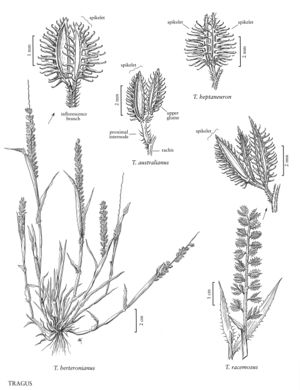Difference between revisions of "Tragus heptaneuron"
FNA>Volume Importer |
imported>Volume Importer |
||
| (5 intermediate revisions by 2 users not shown) | |||
| Line 26: | Line 26: | ||
-->{{#Taxon: | -->{{#Taxon: | ||
name=Tragus heptaneuron | name=Tragus heptaneuron | ||
| − | |||
|authority=Clayton | |authority=Clayton | ||
|rank=species | |rank=species | ||
| Line 33: | Line 32: | ||
|basionyms= | |basionyms= | ||
|family=Poaceae | |family=Poaceae | ||
| + | |illustrator=Linda A. Vorobik;Annaliese Miller | ||
| + | |illustration copyright=Utah State University | ||
|distribution=S.C. | |distribution=S.C. | ||
|reference=None | |reference=None | ||
| Line 38: | Line 39: | ||
|publication year= | |publication year= | ||
|special status= | |special status= | ||
| − | |source xml=https:// | + | |source xml=https://bitbucket.org/aafc-mbb/fna-data-curation/src/200273ad09963decb8fc72550212de541d86569d/coarse_grained_fna_xml/V25/V25_925.xml |
|subfamily=Poaceae subfam. Chloridoideae | |subfamily=Poaceae subfam. Chloridoideae | ||
|tribe=Poaceae tribe Cynodonteae | |tribe=Poaceae tribe Cynodonteae | ||
Latest revision as of 17:59, 11 May 2021
Plants annual. Culms 15-41cm. Ligules 0.5-1 mm; blades 2.5-7 cm long, 3-5 mm wide, glabrous. Panicles 4-9.5 cm long, 7-9 mm wide; rachises pubescent; branches 0.5-1 mm, pubescent, with 2(3) spikelets, axes not extending past the distal spikelets; proximal internodes 0.5-0.8 mm, longer than the second internodes. Spikelets bisexual; proximal spikelets 3-3.5 mm; second spikelets 2.9-3.3 mm. Lower glumes absent or to 0.4 mm, glabrous; upper glumes 3-3.5 mm, minutely pubescent, 7-veined; glume projections 6-9, in 7 rows, 0.1-0.6(1) mm, uncinate; lemmas (2)2.3-2.7 mm, sparsely pubescent on the back; paleas 2.1-2.3 mm; anthers 3, 0.3-0.6 mm, yellow. Caryopses (1.2)1.4-1.6 mm long, 0.6 mm wide. 2n = unknown.
Discussion
Tragus heptaneuron is native to tropical Africa, but it has been collected in Florence County, South Carolina.
Selected References
None.
